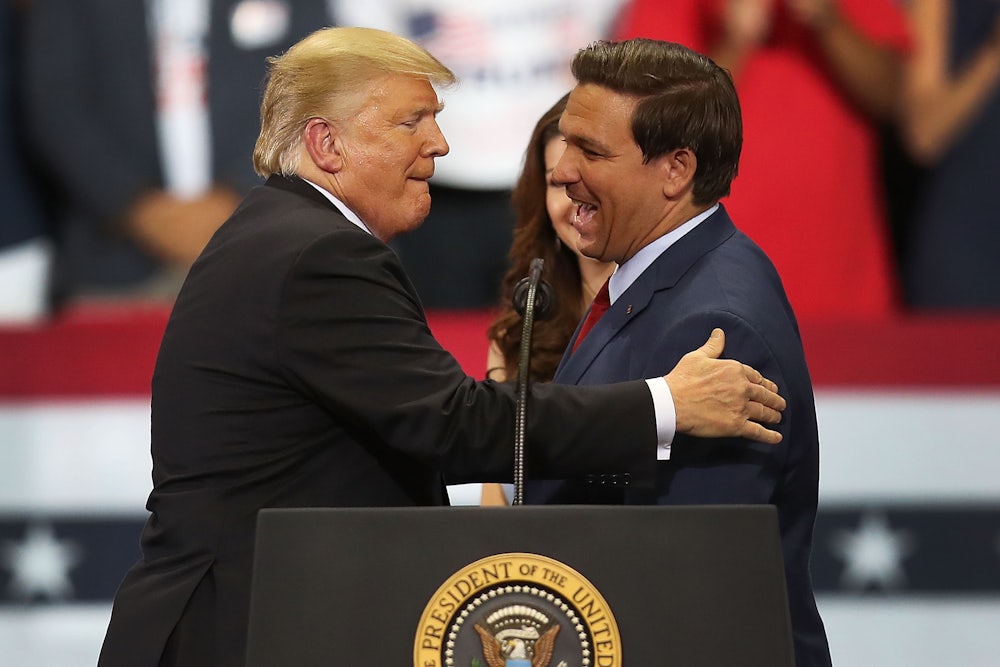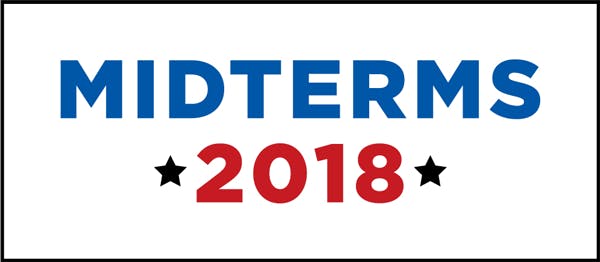The battle in Florida between Ron DeSantis, a Trumpist Republican congressman, and Andrew Gillum, a black progressive mayor, is one of the tightest and most high-profile gubernatorial races of 2018. It’s also the ugliest.
The gloves came off in late August, when DeSantis said on Fox News that Florida should not “monkey this up” by electing Gillum, which many interpreted as a racist dog whistle. Since then, the candidates have engaged in a repetitive tit-for-tat: Gillum calls out DeSantis for using racially charged language and palling around with racists, and DeSantis accuses Gillum of bringing up race to distract from corruption allegations that have orbited his mayorship.
The election of Gillum, who is leading by a small margin in polling averages, would be historic. He’d be Florida’s first black governor and its first Democratic governor of the twenty-first century. But the race between Gillum and DeSantis will resonate outside of Florida, and not just because a Gillum victory will be interpreted as a rebuke to President Donald Trump in a state he won by a single point in 2016.
While racism has played a major role in the 2018 midterms, thanks largely to Trump’s desperate attempt to make the migrant caravan a defining issue, the Florida contest is unique in that it’s explicitly a referendum on racism—from Gillum’s perspective, anyway. But such contests may soon become the norm, especially in the South, as Democrats nominate more diverse candidates and Republicans increasingly run campaigns aimed at turning out aggrieved older white voters. Florida’s gubernatorial race may be a harbinger of an even uglier politics in 2020.
DeSantis’s bid for the Republican nomination for governor was bolstered by his perceived closeness to Trump, who endorsed his campaign as far back as December of 2017. Three months earlier, the Jacksonville congressman had added a rider to a spending bill that would end funding for special counsel Robert Mueller’s investigation into Russian interference in the 2016 election. Trump’s support, The New York Times’ Jonathan Martin wrote earlier this year, showed “the broader nationalization of conservative politics, in which a willingness to hurl rhetorical lightning bolts at the left, the media and special counsel Robert S. Mueller can override local credentials, local endorsements and preparedness for a state-based job.”
DeSantis has clung to Trump like a life raft for the past several months. In late July, he released a widely ridiculed ad detailing his deep love for the president: He teaches his daughter Madison to “build the wall” with toy blocks, reads The Art of the Deal to his son Mason, and attempts to teach Madison how to say “Make America Great Again.”
DeSantis’s campaign has also faced a number of accusations of racism, beginning with his “monkey this up” comment in late August. Weeks later, an Idaho-based white supremacist group funded racist robocalls that were “narrated by someone pretending to be Gillum and using an exaggerated minstrel dialect with jungle noises in the background.” The Washington Post reported that DeSantis had attended conferences hosted by a white nationalist and that his campaign’s co-chair was a Florida Republican who had been recorded using the n-word.
The DeSantis campaign has complained that these stories are a distraction from the fact that the FBI is investigating corruption in Tallahassee, where Gillum has been mayor for the last four years. Gillum has not been accused of wrongdoing, but DeSantis and Trump have made it a centerpiece of their case against him. Trump’s appeals, in particular, have featured coded language, contrasting the “Harvard/Yale educated man” DeSantis with the “thief” Gillum.
In Florida there is a choice between a Harvard/Yale educated man named @RonDeSantisFL who has been a great Congressman and will be a great Governor - and a Dem who is a thief and who is Mayor of poorly run Tallahassee, said to be one of the most corrupt cities in the Country!
— Donald J. Trump (@realDonaldTrump) October 29, 2018
But the most electric moment of the campaign occurred during a debate earlier this month. Asked about his connections to racists, DeSantis responded angrily. “How the hell am I supposed to know every single statement someone makes?” DeSantis said. “As governor, I will represent all the people... I am not going to bow down to the altar of political correctness.”
As my grandmother used to say — a hit dog will holler. pic.twitter.com/kC34Ldd0is
— Andrew Gillum (@AndrewGillum) October 25, 2018
“My grandmother used to say, ‘A hit dog will holler,’” Gillum responded, “and it hollered through this room. Mr. DeSantis has spoken. First of all, he’s got neo-Nazis helping him out in this state. He has spoken at racist conferences. He has accepted a contribution—and would not return it—from someone who referred to [Barack Obama] as a ‘Muslim n-i-g-g-e-r.’ When asked to return that money, he said, ‘No.’ He’s using that money to now fund negative ads. Now, I’m not calling Mr. DeSantis a racist. I’m simply saying that the racists believe he’s a racist.”
It’s a clever—and perhaps still underrated—rebuttal. For the last two years, politicians and the media have struggled to deal with the discrepancy between some Republican candidates’ racist supporters and the candidates’ own vehement denials of holding any prejudices. These denials inevitably create muddled, “he said, he said” moments that allow candidates to evade responsibility and affiliation with their most heinous supporters. But Gillum, by tying DeSantis to his associates as well as those who seek to associate themselves with him, erased the space that politicians like him and Trump retreat into when challenged.
“We’re running against an ideology,” Sharon Lettman-Hicks, the senior adviser for Gillum’s campaign, told Rolling Stone’s Jamil Smith. “We’re running against a past. We’re running against Donald Trump. I mean, DeSantis is just a person that was chosen to run what Donald Trump needs to keep a foothold on a major artery of this country. I don’t feel like we have a genuine opponent because we can’t articulate what our opponent stands for. All we can articulate is who our opponent supports.”
But Trump is just one part of the equation. Yes, DeSantis is a hand-picked candidate, but the strategy he’s embracing will outlive the president. As the Republican base of older white voters shrinks due to demographics trends, the party has gone to increasingly extreme measures to animate them to vote—and many candidates, especially in the South, have found that race-based appeals accomplish this better than, say, tax cuts for the rich. That’s why Republican candidates across the country—including DeSantis—are fear-mongering about the migrant caravan, claiming that if Democrats are elected, gang members and terrorists will flood the country. “The caravans can’t just be allowed to overrun our border,” he said earlier this month. “We’re a sovereign country. When you see that developing, obviously that’s orchestrated. Anytime we have massive incursions across our southern border the thing I worry about is that that’s effectively a wet kiss to the drug cartels.”
It’s possible that the Florida gubernatorial race truly is an exception—that it does not herald a darker future in which Republicans make nakedly racist appeals to white voters and Democrats breezily call their opponents racists in order to turn out minority voters. Maybe Gillum, and Stacey Abrams in Georgia, will win their respective gubernatorial bids, and the GOP will abandon its two-pronged strategy of racial incitement and minority-voter suppression. But it’s just as possible that Gillum and Abrams will lose, validating this strategy in Republicans’ minds.
And then there’s the third, and perhaps likeliest, possibility: that Gillum and Abrams win, and the Republicans conclude their mistake was that they didn’t go far enough.

